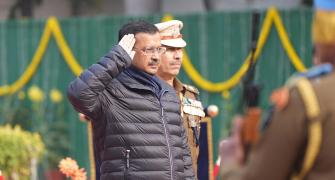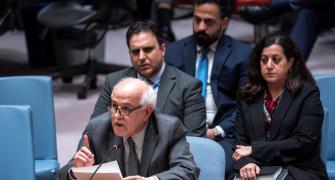The terrorist attacks on Mumbai are nothing short of an act of war against India. There is incontrovertible evidence that the terrorists were Pakistani Lashkar-e-Tayiba operatives, who had been meticulously trained by military personnel, former or serving over several months for this operation.
They came to Mumbai by boat from Karachi and much of the material recovered from them, from toilet paper to grenades, had its origins in Pakistan. Given the Inter Services Intelligence's close links with and patronage of the LeT, as well as the commando style in which it was conducted, leaves no doubt that Pakistan was behind this action.
This incident must sadden every Indian not merely because of its terrible toll on life and property but because it is a scathing indictment of our leadership. We do not enjoy the luxury of explaining it away on grounds of surprise. The 1993 Mumbai blasts were our 9/11 with a casualty toll around double that in the present incident. Since then, with increasing frequency in the last three years, there have been several major terrorist incidents in India undertaken from Pakistan.
The government's inability to prevent such incidents is testimony to its abject failure both, to compel Pakistan to desist from exporting terrorism to India and, to appropriately upgrade its intelligence and security systems, including at the local level, so that the impact of such incidents is minimised.
It is well documented that Pakistan, since its very inception, has been involved in terrorist activities directed against India. The use of terrorism as an instrument of foreign policy against India was progressively refined into a fine art from Zia-ul Haq's time. While under Zia Pakistan fomented Sikh terrorism, subsequently, it guided and supported terrorist outfits, like the LeT, Harkat-ul Mujahideen, Jaish-e-Mohammad, etc, as well as the Bangladesh's Directorate General of Forces Intelligence, in terrorist actions in India.
Successive governments in India have been complicit in emboldening Pakistan to use terrorism against our country by failing to penalise it for so doing. Pakistan's use of razakars in 1947 prompted India to merely engage in a defensive war, which was fought not in Pakistan, but on our soil, resulting in a substantial part of Kashmir being left under illegal Pakistani occupation.
Its covert operations in Kashmir in 1965 evoked a firmer response by way of an attack across the international border but the outcome was no more than a stalemate. Its actions in support of the Sikh and Kashmiri insurgency as well as terrorism elsewhere in the country saw no retaliatory action. The best that the then National Democratic Alliance government could muster up in response to the attack on Parliament was coercive diplomacy which resulted in Pakistan repeatedly promising to ensure that its territory would not be used for terrorism against India and that it would maintain a ceasefire along the LoC.
While the ceasefire held till recently Pakistan never stopped using terrorism as an instrument of foreign policy against India. The United Progressive Alliance government's record in this regard has been even worse. Far from chastising Pakistan, it projected it as a "victim" of terror, argued that we must distinguish between actions taken by terrorist groups which are not in the control of Pakistan and those undertaken by the state, and went so far as to set up a joint anti terror mechanism with it thereby undermining the possibility of mounting concerted international pressure on Pakistan for its actions in support of terrorism.
Even Afghanistan has been more forthright than India in criticising Pakistan for its involvement in terrorist activities. In this background, is it any surprise, therefore, that Pakistan continues to bleed us with a thousand cuts confident that a pusillanimous India will only bleat, not bite? Indeed, unless India adopts a much more proactive policy designed to make the use of terror painful for Pakistan there will be many more Mumbai like incidents.
If the UPA government's management of relations with Pakistan has left much to be desired, its management of our intelligence and security systems, essential to our having been able to foresee the Mumbai incident and deal with it effectively, has been abysmal. This is particularly regrettable as more had been done in India for security, from April 1999 to December 2004, than ever before in terms of establishing systems and structures and charting out a comprehensive reform of the national security system in its entirety. Indeed, execution of nearly 350 recommendations emanating from the Group of Ministers Report of 2001 on national security reform was well underway when the UPA government assumed office.
These reforms, evolved on the basis of advice given by our best experts in the field were inter alia designed precisely to forestall the possibility of our being taken by surprise, as we had been at Kargil, either from land, from the air or by sea. Many of the structures and systems created, as a result of the reform process, have not been nurtured, or have been undone, and such reforms as are being pursued are progressing at a snail's pace. Tardy implementation of security related reforms such as the setting up of marine police in our coastal states, strengthening of the coast guard, modernisation of state police forces etc are, to an extent, responsible for our inability to minimize the impact of the terrorist actions in Mumbai.
It is common knowledge that the National Security Council Secretariat, which was functioning as the apex intelligence agency, has been gutted, with the revival of the Joint Intelligence Committee, whose functions had, in 1999, been subsumed within the NSCS, and with the appointment of three superannuated secretary level officers at its head. This has inevitably impacted negatively on its role as a coordinator of intelligence, as the key player in tasking and evaluating the agencies, and as the final assessor of the threat advisories put out by the intelligence collecting agencies.
It is well known that intelligence collecting agencies issue innumerable warnings, many of which are not actionable and in most cases the projected threat does not materialise. If each of these was taken at face value the country would be in a state of nervous breakdown! It is up to the final assessment agency, in India's case the NSCS, (now possibly once again the JIC?) with access to inputs from all the agencies as well as open sources, to join the dots, validate the advisories issued, spell out the nature of the threat and call for remedial action. This clearly did not happen and hence we were caught napping at Mumbai.
The government's criminal neglect in addressing the terrorist threat from Pakistan was matched by its casual management of the crisis as it unfolded in Mumbai. The errors were innumerable and indicative of the absence of a firm hand at the wheel. The 12-hour delay in deployment of the NSG is, perhaps, the most glaring. The inability to take out the terrorists quickly raises questions about adequacy of training, drills, tactics, protocols, weapons etc of the forces deployed. Media management was non existent. The media should not have been allowed access to within a mile of the affected area and individuals from the various organisations involved in the operations should not have been permitted to interact with it. Instead, frequent media briefings should have been organised through a team of designated spokespersons. This would have starved the terrorists of much useful information through the incessant media chatter. Crowd management also left much to be desired. In fact, the terrorists could have inflicted much higher casualties had they simply opened fired upon the mass of humanity milling around Nariman House.
India's response to the Mumbai attacks is still in a state of evolution, influenced, at one extreme by the enormous public anger against Pakistan and, at the other by the UPA government's peacenik mindset and reluctance to move beyond the US prescribed lakshman rekha of "restraint". Symbolic of the latter was the harebrained idea, modelled on the now discredited joint terror mechanism set up in the aftermath of the 2006 Mumbai serial train blasts apparently to mollify the public, to call the Pakistani DG ISI for discussions.
Apparently, the government, after each Pakistani inspired terrorist incident has the inexplicable urge to get into bed again with its rapist! Rather than squarely blaming Pakistan for its involvement in the Mumbai attacks it still adheres to the US dictated line that the attack was not a Pakistani state inspired exercise but came only from elements in that country and that they must be brought to book. Such a mild approach is irrational as it ignores the well documented symbiotic relationship between terrorism and the Pakistani state which has been cultivated over the decades. As long as Indian leaders do not recognise this a meaningful response to Pakistani terrorist actions against us cannot be fashioned.
Pakistan's involvement with terrorist activities directed against us can only be curbed by making it extremely painful to pursue such a policy. This can be achieved only through use of all the instrumentalities of state power and could entail the following specific measures:
- Suspension of the composite dialogue process in order to make it clear that there can be no business as usual with Pakistan till it mends its ways;
- Undertaking of a sustained and well prepared campaign to project Pakistan as it is, notably a terrorist state, so that harsh international sanctions are imposed on it;
- Termination of many of the CBMs, particularly those designed to help Pakistan economically. In fact, we should not hesitate to take actions that undermine Pakistan's economy
- Exploitation of the faultlines of Pakistan as it has consistently done vis a vis India;
- Serve notice for the renegotiation of the Indus Waters Treaty, thus indicating our resolve to use water as a pressure point against Pakistan; in the meantime minimise the release of Indus waters to Pakistan through maximum use of water in India as permitted under the Treaty
- Address terrorist outfits through covert action and if need be through focused military strikes.
Some of the arguments adduced against such robust action are that the US will force Pakistan to give us satisfaction, that we need to distinguish between the civilian regime and the military in Pakistan and not penalise the former, and that Pakistan is a nuclear weapon state. In this context, the following may be mentioned:
- We should not expect the US to pull our chestnuts out of the fire. Their record hardly inspires confidence. The US promises much and delivers little. We must not be satisfied by the cosmetic measures that Pakistan may take such as the arrest of the odd LeT commander or a raid on a LeT camp in PoK. India must ensure the complete shutdown of the infrastructure of terror in Pakistan.
- While there is some merit in making a distinction between the military and the civilian regime in the ultimate analysis reactions to Pakistan have to be dictated by what its government, whether civilian or military, does. Everyone knows that, in the instant case, the military calls the shots in Pakistan and, therefore, the regime in that country is civilian only in name. The civilians in Pakistan can hardly expect India to fight their battles for them against their military. It is up to them to tell the military to refrain from patronising terrorists not only because it hurts India but Pakistan as well.
- Pakistan's nuclear capability should not push us into a paralysis of action. India, too, is a nuclear weapon state and use of such weapons against us is unlikely because of our deterrent capabilities.
Finally, let us recognise that no one is going to fight our battles for us, that only we can safeguard our security and integrity through our own actions, and that any outside help, whether by a super power or the international community, can only be supplementary to our own efforts.
Satish Chandra is former deputy National Security Advisor.







